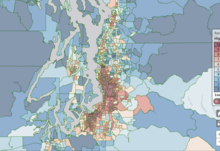0
Interactive
Community:
Jan 11, 2019
A new mapping tool can help you learn more about the state of environmental health, wherever you live in Washington.
Authored by: Kamna Shastri for KUOW
Topics: Health, Housing, Pacific Northwest, Research
 Shared by Housing Is
Shared by Housing Is
Housing Is posted a
on Jan 17, 2019
A new mapping tool can help you learn more about the state of environmental health, wherever you live in Washington.
0
News Article
Community:
Dec 24, 2018
When homeless people get released, their issues combined with living on the street will usually land them back in emergency rooms, costing hospitals like Harborview Medical Center — which operates on a thin margin — time and money. One solution is a type of respite program that provides short-term care to homeless patients who are too sick to be on the streets or in a shelter, but not sick enough to continue to take up a hospital bed.
Authored by: Scott Greenstone for The Seattle Times
Topics: Health, Homelessness, Housing, Pacific Northwest, Partnerships, Place-based, Preventative care, Stability
 Shared by Mica O'Brien
Shared by Mica O'Brien
Mica O'Brien posted a
on Jan 7, 2019
Scott Greenstone for The Seattle Times
When homeless people get released, their issues combined with living on the street will usually land them back in emergency rooms, costing hospitals like Harborview Medical Center — which operates on a thin margin — time and money.
0
News Article
Community:
Nov 2, 2018
Public health officials have known for decades that where you live greatly influences how long you can live. Residents who live in neighborhoods free of violence with good housing and schools and with close access to quality medical care, food and parks live longer than those who don’t. Now a recently released report — called the United States Small-Area Life Expectancy Estimates Project, or USALEEP — shows in obvious, color-coded terms the range and proximity of that disparity.
Authored by: Christian Hill for The Register-Guard
Topics: Community development, Health, Low-income, Pacific Northwest, Place-based, Research
 Shared by Mica O'Brien
Shared by Mica O'Brien
Mica O'Brien posted a
on Nov 8, 2018
Christian Hill for The Register-Guard
Public health officials have known for decades that where you live greatly influences how long you can live. Residents who live in neighborhoods free of violence with good housing and schools and with close access to quality medical care, food and parks live longer than those who don’t.
0
Webinar
Community:
Sep 26, 2018
The Colorado Coalition for the Homeless (CCH) has been investing in supportive housing since 1990. Since that time, this comprehensive community health center has developed nearly 1,700 units of housing, and is one of the country’s leaders in integrating health care and housing for a vulnerable population.
This webinar discusses how CCH finances its capital development; how they plan, design, and manage multiple projects simultaneously; how they integrate housing and health care services; and how they include property management staff in a coordinated approach to care. This conversation with members of CCH’s leadership complements our recent policy brief and included time for audience Q&A.
Authored by: National Health Care for the Homeless Council
Topics: Health, Homelessness, Low-income, Medicaid / Medicare, Mental health, Pacific Northwest, Place-based, Supportive housing
 Shared by Mica O'Brien
Shared by Mica O'Brien
Mica O'Brien posted a
on Oct 9, 2018
National Health Care for the Homeless Council
The Colorado Coalition for the Homeless (CCH) has been investing in supportive housing since 1990.
0
Report
Community:
Aug 9, 2018
The Colorado Coalition for the Homeless created the Denver Housing First Collaborative (DHFC) in 2003 with funding provided by a collaboration of federal agencies. The DHFC involved CCH as the lead agency, Denver Department of Human Services (DDHS), Denver Health (DHHA), Arapahoe House, the Mental Health Center of Denver (MHCD) and the Denver VA Medical Center. The DHFC is designed to provide comprehensive housing and supportive services to chronically homeless individuals with disabilities. Initial federal funding created the capacity to house and serve 100 chronically homeless individuals. The program uses a housing first strategy combined with assertive community treatment (ACT) services, providing integrated health, mental health, substance treatment and support services.
Authored by:
Topics: Cost effectiveness, Funding, Health, Homelessness, Housing, Pacific Northwest, Partnerships, Research, Stability, Supportive housing
 Shared by Housing Is
Shared by Housing Is
Housing Is posted a
on Aug 9, 2018
The Colorado Coalition for the Homeless created the Denver Housing First Collaborative (DHFC) in 2003 with funding provided by a collaboration of federal agencies.
0
Interactive
Community:
Jul 20, 2018
Kaiser Permanente NW Community Benefit intends to award at least $1.5 million in community grants to support organizations that help people with behavioral health challenges to secure and maintain safe, stable housing. A minimum of five grants of up to $325,000 will be awarded for projects lasting 3 ½ years. Projects must include the involvement of peers or community health workers (CHWs) and must involve collaboration between housing providers, health care providers (including behavioral health service providers) and those community organizations employing peers or CHWs.
Authored by:
Topics: Funding, Health, Homelessness, Housing, Mental health, Pacific Northwest, Partnerships, Place-based, Preventative care, Substance abuse
 Shared by Housing Is
Shared by Housing Is
Housing Is posted a
on Jul 20, 2018
Kaiser Permanente NW Community Benefit intends to award at least $1.5 million in community grants to support organizations that help people with behavioral health challenges to secure and maintain safe, stable housing.


 Shared by Housing Is
on Jan 17, 2019
Shared by Housing Is
on Jan 17, 2019



 Shared by Housing Is
on Aug 9, 2018
Shared by Housing Is
on Aug 9, 2018
 Shared by Housing Is
on Jul 20, 2018
Shared by Housing Is
on Jul 20, 2018